Flandr' Surname Ancestry ResultsOur indexes 1000-1999 include entries for the spelling 'flandr''. In the period you have requested, we have the following 9 records (displaying 1 to 9): Buy all | | | Get all 9 records to view, to save and print for £36.00 |
These sample scans are from the original record. You will get scans of the full pages or articles where the surname you searched for has been found. Your web browser may prevent the sample windows from opening; in this case please change your browser settings to allow pop-up windows from this site. Pipe Rolls: Cambridgeshire and Huntingdonshire
(1189-1190)
The Great Rolls of the Pipe contain returns of income and expenditure from the sheriffs and farmers of the various English sheriffdoms, counties or shires and from honors and bishoprics in the hands of the crown. This is the roll for the 1st year of the reign of king Richard I, that is, accounting for the year from Michaelmas 1189 to Michaelmas 1190. Many of the individual surnames that appear are in the accounts of fines &c. levied by justices.FLANDR'. Cost: £4.00.  | Sample scan, click to enlarge
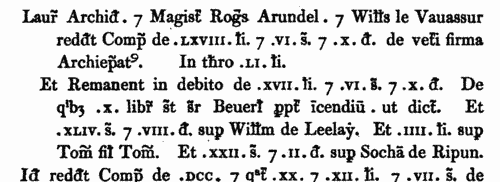
| Pipe Rolls: Devonshire
(1189-1190)
The Great Rolls of the Pipe contain returns of income and expenditure from the sheriffs and farmers of the various English sheriffdoms, counties or shires and from honors and bishoprics in the hands of the crown. This is the roll for the 1st year of the reign of king Richard I, that is, accounting for the year from Michaelmas 1189 to Michaelmas 1190. Many of the individual surnames that appear are in the accounts of fines &c. levied by justices.FLANDR'. Cost: £4.00.  | Sample scan, click to enlarge
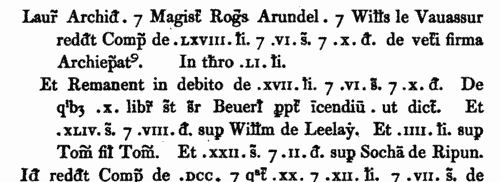
| Pipe Rolls: Hampshire
(1189-1190)
The Great Rolls of the Pipe contain returns of income and expenditure from the sheriffs and farmers of the various English sheriffdoms, counties or shires and from honors and bishoprics in the hands of the crown. This is the roll for the 1st year of the reign of king Richard I, that is, accounting for the year from Michaelmas 1189 to Michaelmas 1190. Many of the individual surnames that appear are in the accounts of fines &c. levied by justices.FLANDR'. Cost: £4.00.  | Sample scan, click to enlarge
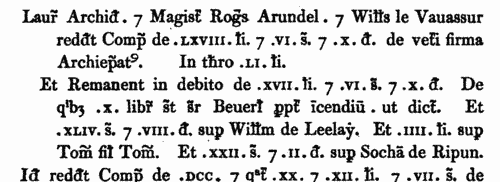
| Pipe Roll
(1201-1202)
The Great Rolls of the Pipe are the central record of the crown compiling returns of income and expenditure from the sheriffs and farmers of the various English counties or shires. This is the oldest series of public records, and the earliest surviving instances of many surnames are found in the Pipe Rolls. Two sets of pipe rolls were prepared, not exact duplicates, the main series being the Treasurer's or Exchequer rolls, the copies (of which fewer have survived) being the Chancellor's rolls. The Chancellor's roll (or Antigraphum) for the 3rd year of king John became separated from that series at some date, and found its way to the miscellaneous records in the Chapter House at Westminster. As it happens, the Chancellor's roll for that year is in a better state of preservation than the Treasurer's roll, so it was chosen for publication by the Commissioners on the Public Records of the Kingdom, by whom it was printed in extenso in 1833. FLANDR'. Cost: £4.00.  | Sample scan, click to enlarge
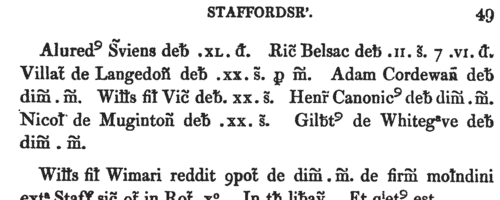
| Curia Regis Rolls
(1210-1212)
The Curia Regis, king's court, of mediaeval England took cases from throughout the country, and its records are among the most important surviving from this early period.FLANDR'. Cost: £4.00.  | Sample scan, click to enlarge

| Oblata or Fine Rolls
(1200-1216)
All the surviving oblata or fine rolls of the reign of king John were edited by Thomas Duffus Hardy and printed by the Commissioners of the Public Records in 1835. These are the oblata rolls of the 1st, 2nd and 3rd years of the reign, and the fine rolls of the 6th, 7th, 9th, 15th, 16th and 17th years. These rolls contain notices of the oblations or fines offered to the Crown to procure grants and confirmations of liberties and franchises of markets, fairs, parks and free warren; for exemption from tolls, pontage, passage and murage; to obtain justice and right; to stop, delay or expedite pleas, trials and judgments; and to remove suits and processes from inferior tribunals into the King's Court. Fines were also extracted for licence to trade, or permission to exercise commerce or industry of any kind, and to have the aid, protection, or goodwill of the King; to mitigate his anger or abate his displeasure; to be exempted from knighthood either for a term or for ever, and from attending the King in his foreign expeditions; they were also demanded for seisin or restitution of ancestral lands or chattels; for allowing delinquents to be replevied or bailed; for acquittal of murder; and for pardon of trespasses and misdemeanours; for the 'year and a day' of the lands and goods of felons and fugitives. Almost all entries have the county in question indicated in the left hand margin.FLANDR'. Cost: £4.00.  | Sample scan, click to enlarge

| Liberate Rolls
(1245-1251)
These chancery liberate rolls of the 30th to 35th years of the reign of Henry III of England record the details of payments and allowances as part of the administration of government. Most entries start with the Latin words 'liberate', meaning 'deliver', or 'allocate', meaning allow. There are also 'contrabreves', warrants mainly to sheriffs of shires, assigning them tasks and allowing expenses. Most of the entries relate to England and Wales, but there are occasional references to Ireland and the English possessions in France.FLANDR'. Cost: £4.00.  | Sample scan, click to enlarge

| Clerks and Clergy in Yorkshire, Nottinghamshire, and parts of Lancashire, Westmorland, and Northumberland
(1215-1255)
The register of archbishop Walter Gray of York, containing general diocesan business, mostly relating to clergy. The diocese of York at this period covered all of Yorkshire and Nottinghamshire, as well as Lancashire north of the Ribble, southern Westmorland, and Hexhamshire in Northumberland. The register survives as two rolls (called the Major and the Minor), in all amounting to nearly 71 feet of parchment. It is thought that a third roll or more has been lost, because the acts of the archbishop for the last ten years of his episcopate are missing, as are all the ordination and ecclesiastical discipline records for his reign. The then unpublished parts of the register were edited for the Surtees Society by James Raine and printed in 1870, with some additional material included in appendices.FLANDR'. Cost: £4.00.  | Sample scan, click to enlarge

| Clerks, clergy, benefactors and tenants of Ripon, Yorkshire
(1178-1474)
The Ingilby Manuscript, containing part of a chapter act book, and a considerable fragment of a 14th-century cartulary, bound together some valuable early records surviving from the mediaeval collegiate church of St Peter and St Wilfrid at Ripon in the West Riding of Yorkshire. The manuscript was edited by Canon J. T. Fowler and published by the Surtees Society in 1908. The church had the patronage of many local advowsons, and the act book includes presentations and institutions to these, as well as other matters of internal administration. The cartulary is a compilation of copies of deeds by which local benefactors granted land to the college: most of the earlier ones are undated. The names that appear are those of the donors, of occasional tenants or occupiers of adjoining land, and also the witnesses to the charters. Most of the land granted was in the immediate vicinity of Ripon.FLANDR'. Cost: £4.00.  | Sample scan, click to enlarge
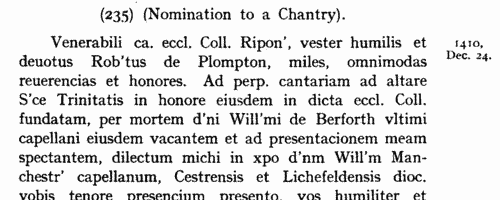
|
Research your ancestry, family history, genealogy and one-name study by direct access to original records and archives indexed by surname.
|











